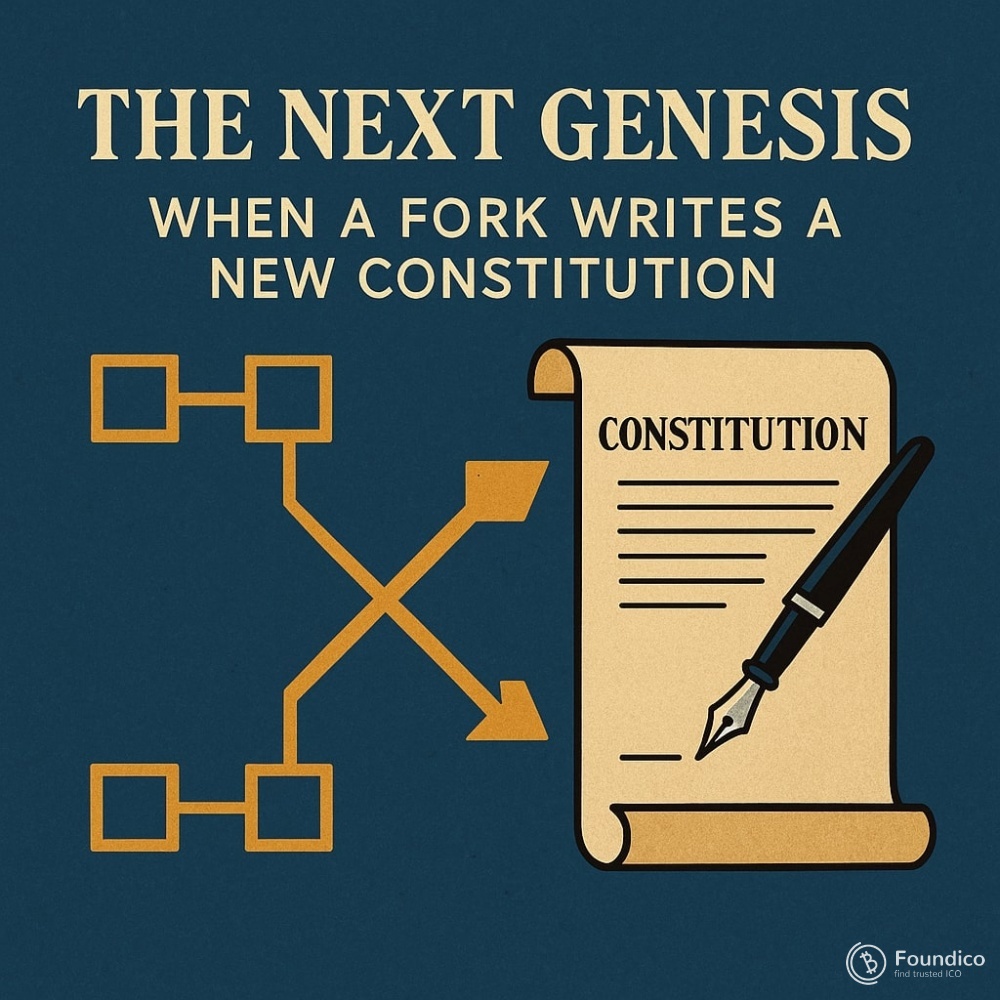The Next Genesis: When a Fork Writes a New Constitution

By Dr. Pooyan Ghamari, Swiss Economist and Visionary
Every civilization in history has been defined by its constitutions—written or unwritten rules that establish authority, rights, and responsibilities. In the digital age, blockchains have become our new societies, and their “constitutions” are not drafted in parliaments but embedded in code. When disagreements arise, when visions diverge, or when power becomes imbalanced, the community faces a decision: reform or fork.
Forks as Constitutional Revolutions
A fork is not simply a technical split—it is a political act. It is the blockchain equivalent of drafting a new constitution. Just as revolutions throughout history have redrawn borders, redefined citizenship, and restructured economies, a fork rewrites the foundations of a digital society.
Whether it was Bitcoin Cash branching from Bitcoin or Ethereum’s infamous split after the DAO incident, each fork represented more than code. It embodied conflict over values: immutability versus intervention, stability versus experimentation, consensus versus dissent.
The Power of Genesis Moments
The birth of a new chain is akin to a nation’s founding. Genesis blocks are not just ledgers—they are declarations of independence. In that moment, the community chooses what it will protect, whom it will empower, and how it will distribute trust.
Forks remind us that decentralization is not static. It is evolutionary. Unlike rigid constitutions of nation-states, blockchain governance can literally reset itself, embedding new priorities at the code level. This fluidity is both liberating and destabilizing—it offers hope for renewal but also risks fragmentation.
The Stakes of Forking
When a community decides to fork, the consequences are profound:
-
Legitimacy: Which version of the chain is the “real” one? Legitimacy is not coded—it is socially negotiated.
-
Power dynamics: Forks redistribute power among developers, miners, validators, and users, often exposing hidden hierarchies.
-
Economic impact: Wealth can double, markets can split, and investors are forced to choose allegiance.
-
Philosophical clarity: A fork crystallizes what values a community refuses to compromise on.
Writing the New Constitution
If the next great fork is to matter, it must be more than reactionary. It must set forth a new vision of governance, one that transcends the empires of BTC and ETH and avoids replicating the very hierarchies decentralization sought to dismantle.
The “new constitution” should emphasize:
-
Privacy as a non-negotiable right.
-
Governance that resists capture by elites or corporations.
-
Flexibility to evolve without abandoning core principles.
-
A commitment to resilience, ensuring the system cannot be co-opted or censored.
Toward the Next Genesis
The future of decentralization will not be written in policy documents or regulatory frameworks. It will be written in code. The next genesis will come when a fork is bold enough to declare independence not just from legacy finance but from the creeping centralization of today’s leading chains.
That fork will not simply be a divergence—it will be a constitution for a new digital civilization.
The choice is ours: remain subjects under early empires, or seize the opportunity to found a new genesis—one that encodes sovereignty, freedom, and equality at the very heart of its design.

 Snorter - Snorter Bot ($SNORT) is a Telegram-native, meme-fueled trading terminal for Solana and beyond. Built for speed, stealth, and degen-level execution, Snorter lets you swap, snipe, and copy-trade straight from chat. Powered by the $SNORT token, it's the fastest way to hunt launches, dodge rugs, and flip your way to the top before anyone else even loads the chart.
Snorter - Snorter Bot ($SNORT) is a Telegram-native, meme-fueled trading terminal for Solana and beyond. Built for speed, stealth, and degen-level execution, Snorter lets you swap, snipe, and copy-trade straight from chat. Powered by the $SNORT token, it's the fastest way to hunt launches, dodge rugs, and flip your way to the top before anyone else even loads the chart.